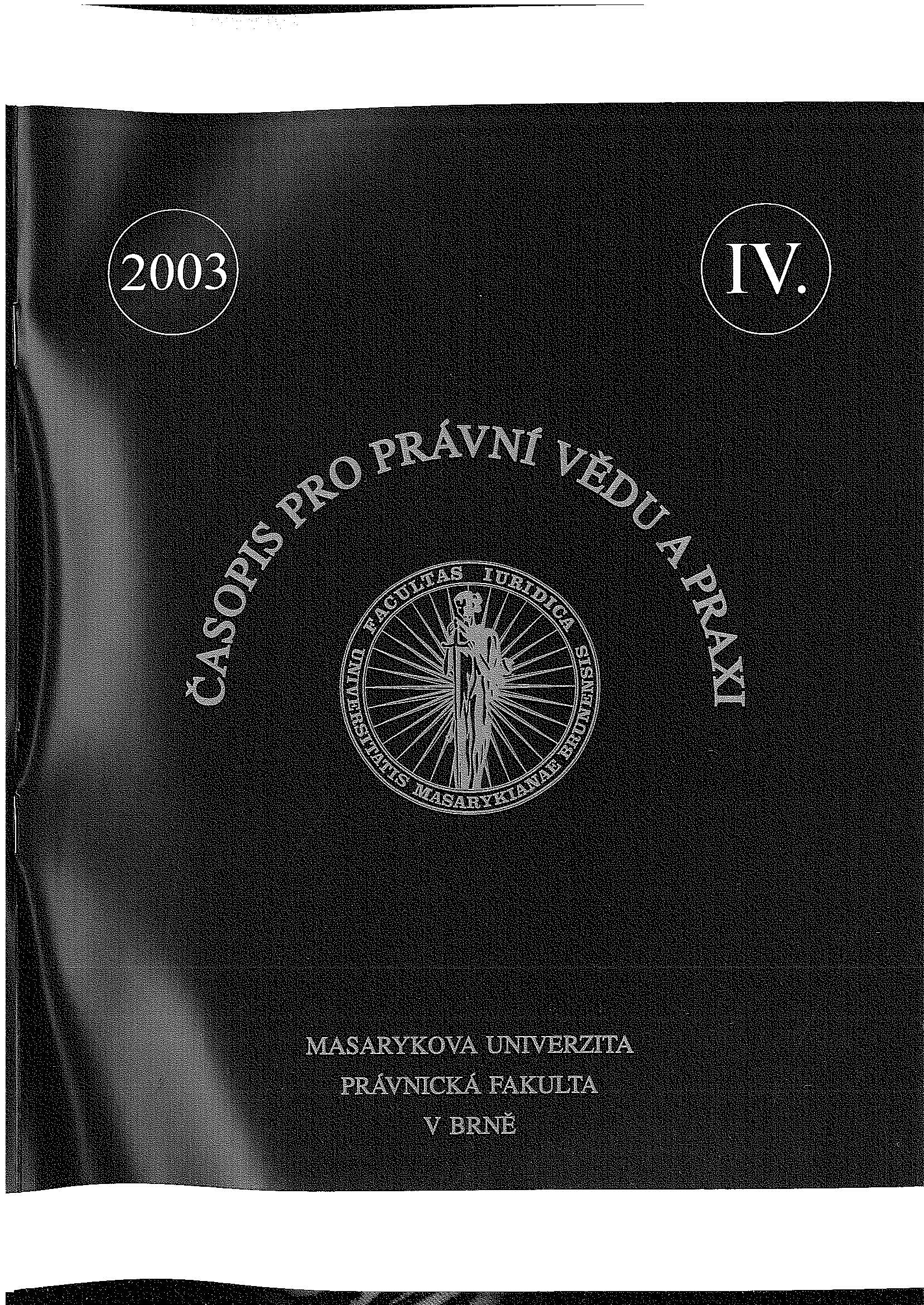
Hodnoty práva vo svetle súčasného sveta
Ak sa pozrieme na život a svet okolo nás, často si povzdychneme: "kde sú a kam sa podeli hodnoty ako poctívosť, čestnosť, priaterstvo, morálka, atd'."
More...We kindly inform you that, as long as the subject affiliation of our 300.000+ articles is in progress, you might get unsufficient or no results on your third level or second level search. In this case, please broaden your search criteria.

Ak sa pozrieme na život a svet okolo nás, často si povzdychneme: "kde sú a kam sa podeli hodnoty ako poctívosť, čestnosť, priaterstvo, morálka, atd'."
More...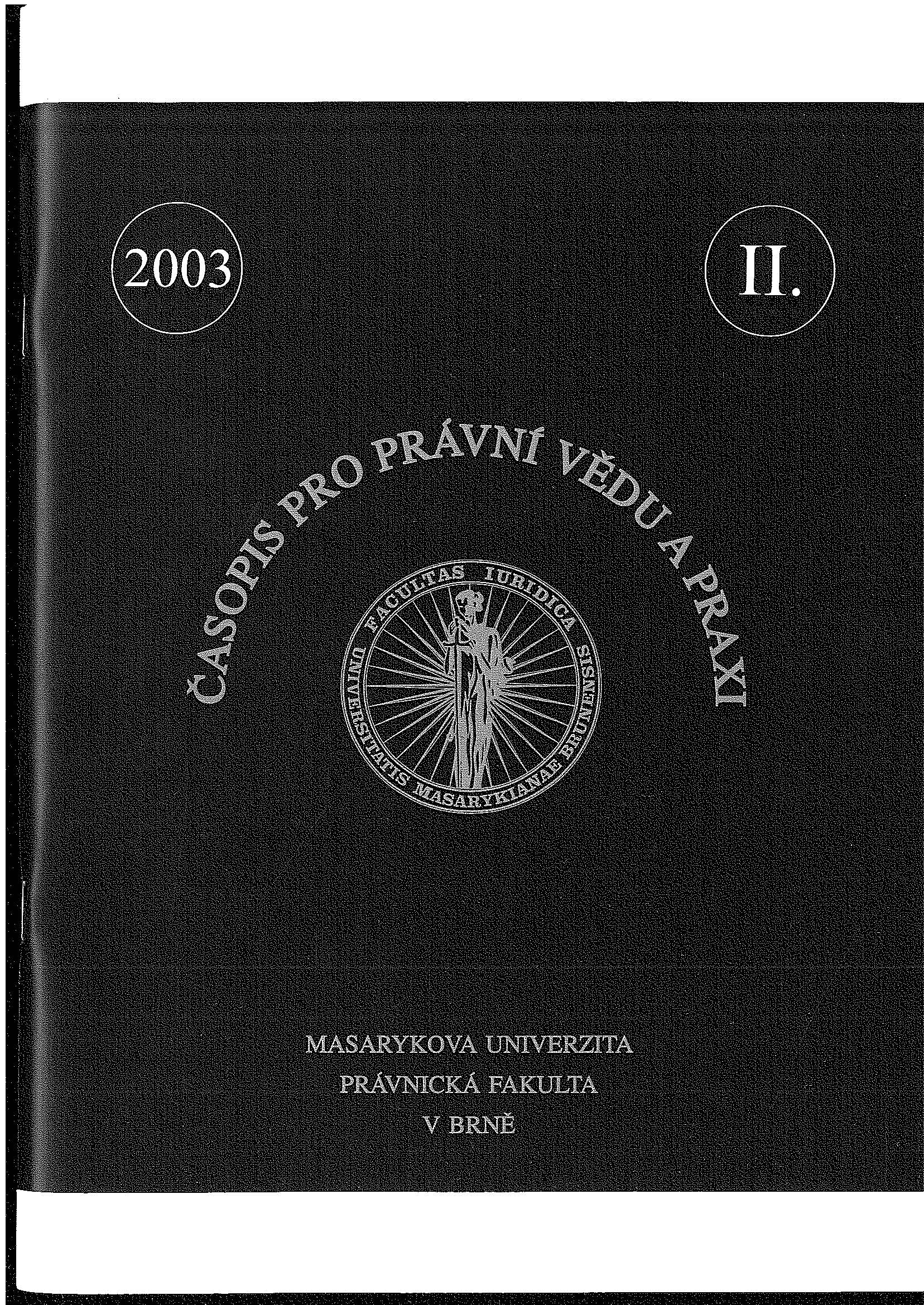
Every systemic reform, including public administration reform, is accompanied by the search for answers to questions of the economic impact of the reform. The Czech Republic, like other democratic states from the former Eastern bloc, is striving to achieve the legal and administrative standard of the member states of the European Union through extensive reforms. The main obstacles to these reforms are the problems of stagnation or economic decline. And I dare say that the level of performance of public administration is directly dependent on the material security of its functioning.
More...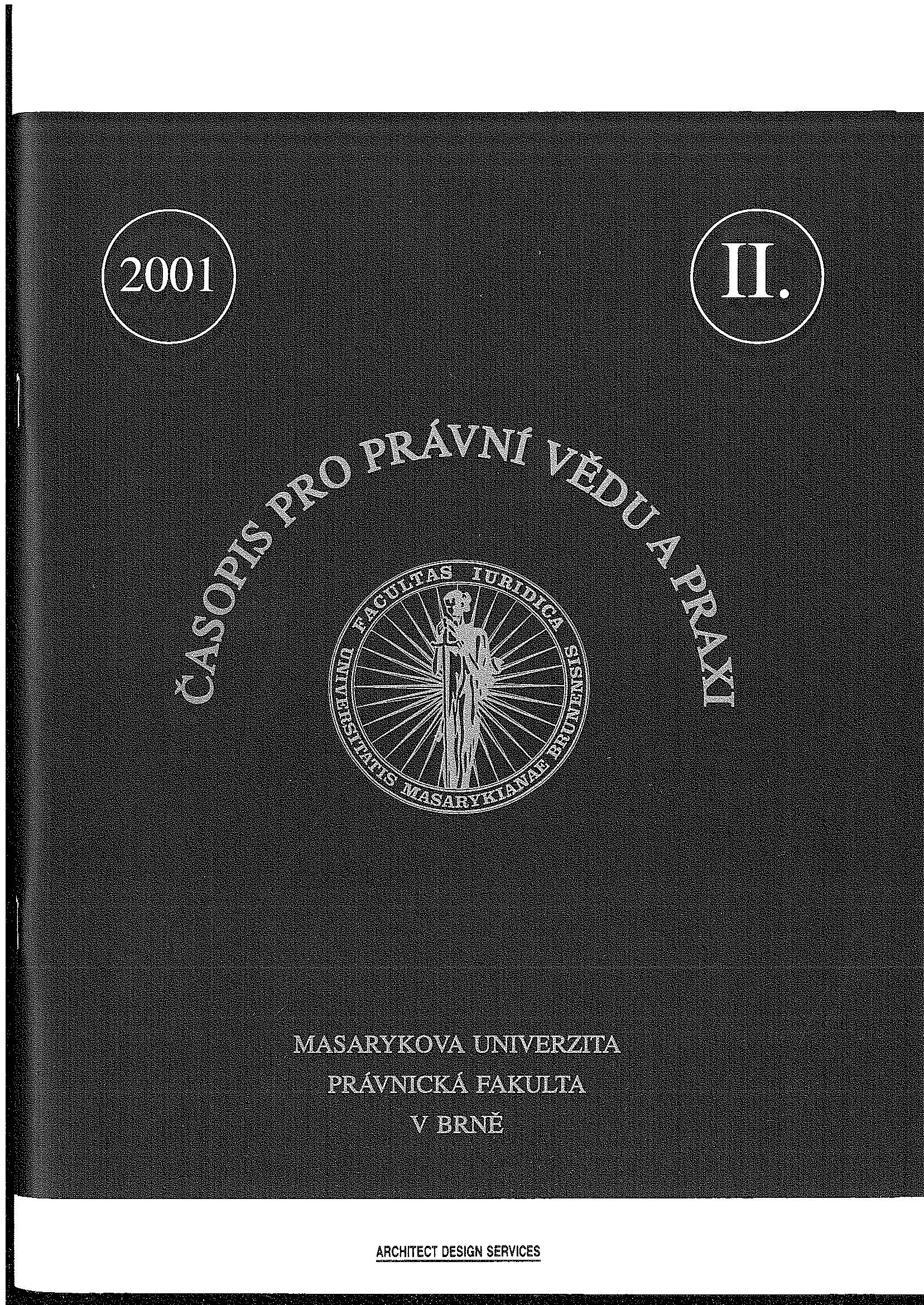
Few words have such a long and turbulent history as "justice." After all, what other word can you find carved on ancient temples, depicted as goddesses, depicted in various ways on the oldest papyri, in the oldest books, which are finally published as the work of God ?! We can say with certainty that justice is a term that has been used for several thousand years, probably in all the languages of the world. The search for justice, or the content or meaning of the word justice, belongs to the oldest works of philosophy and further sciences and sociocultural systems based on it or related to it, such as law, religion, ethics, but also other sciences that we commonly understand as part of philosophy.
More...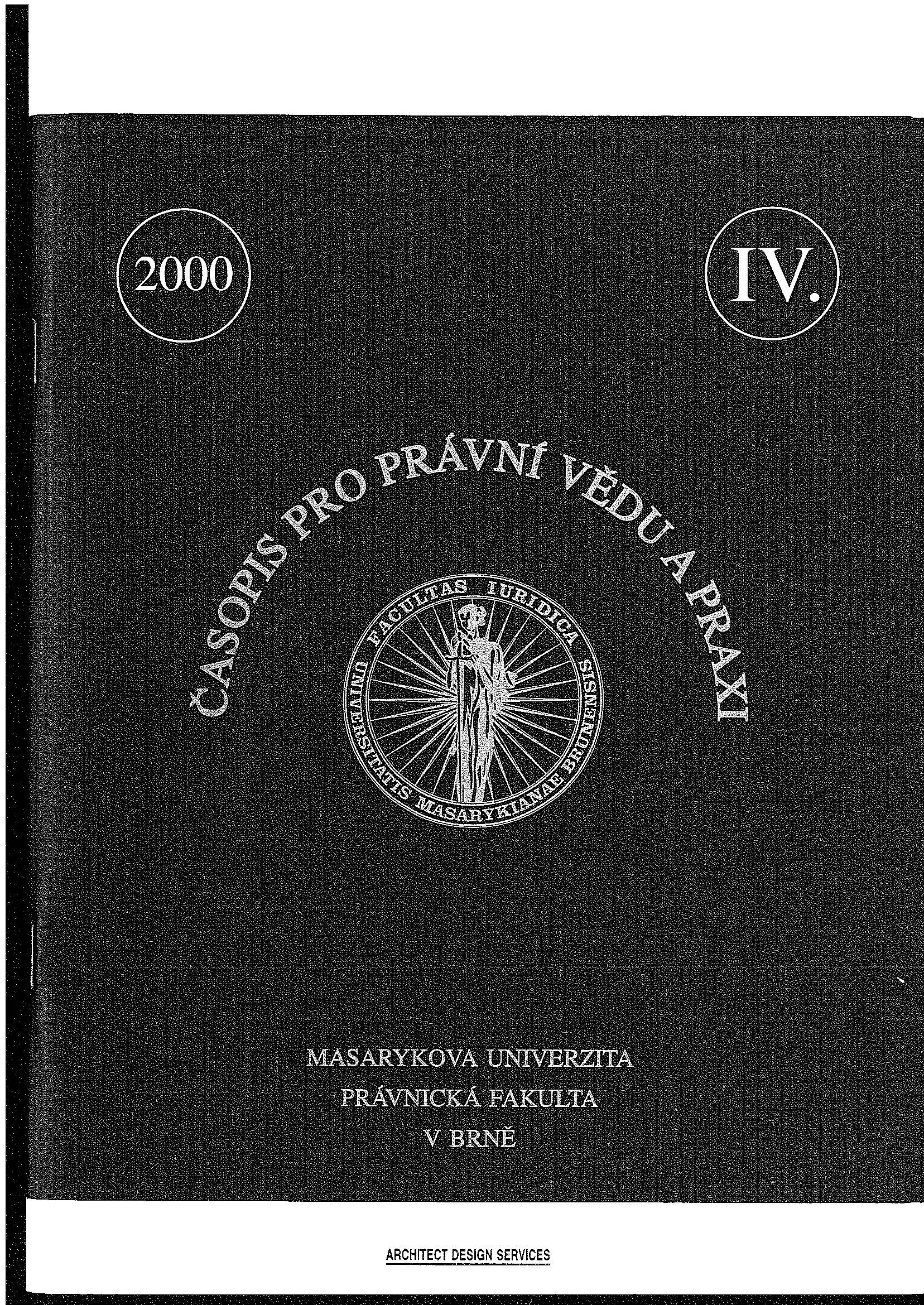
Knowledge about law, ie its existence, creation and implementation, forms a distinctive group of social information - legal information. They are a means of direct or mediated knowledge of the law, which takes place at various levels - from a conscious feeling of binding and state-enforceable rules of conduct to awareness of the existence of valid law and intentional, situational or more or less systematic acquisition of knowledge about its specific normative form, through personal experience with its implementation to the understanding of law as a system of values of power.
More...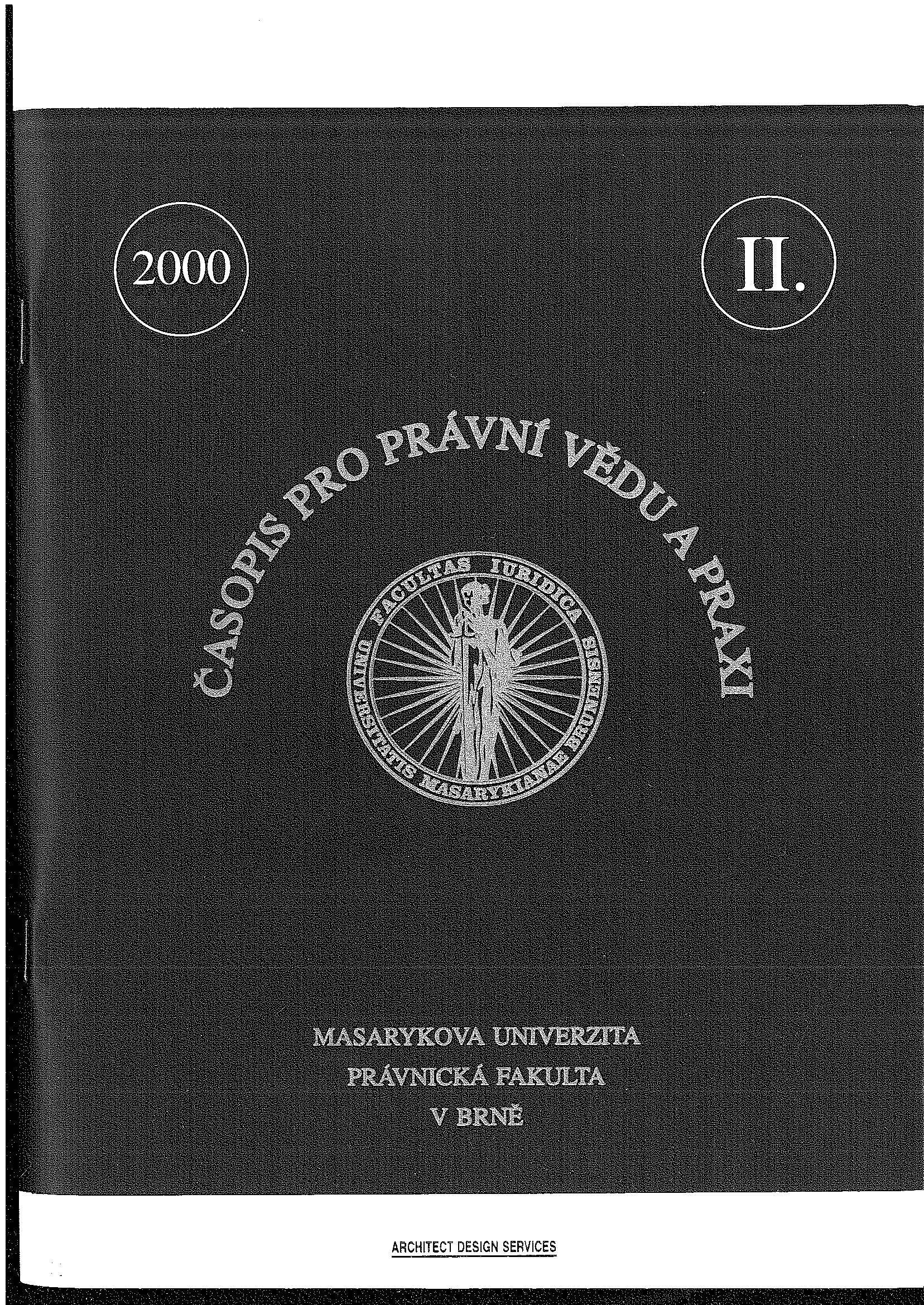
V posledních letech se objevilo několik učebnic a učebních pomůcek věnovaných právní filozofii. Názvy těchto učebnic však nejsou jednotné a objevuje se zde jak termín "právní filozofie", tak i termín "filozofie práva". Volbu určitého názvu učebnice většinou autoři nezdůvodňují, proto ani nevíme, co je vedlo k tomu, že zvolili určité označení. Na první pohled se zdá, že jde jen o dvě různá spojení slov, jež označují stej nou vědní disciplínu. V prvním spojení vystupuje slovo "právo" v pozici adjektivu, který specifikuje vlastnosti filozofie jako kritického způsobu poznání (reflexe) světa. Adjektivum "právní" před slovem filozofie dává najevo, že existuje systém přístupů a metod umožňujících filozofické poznání práva.
More...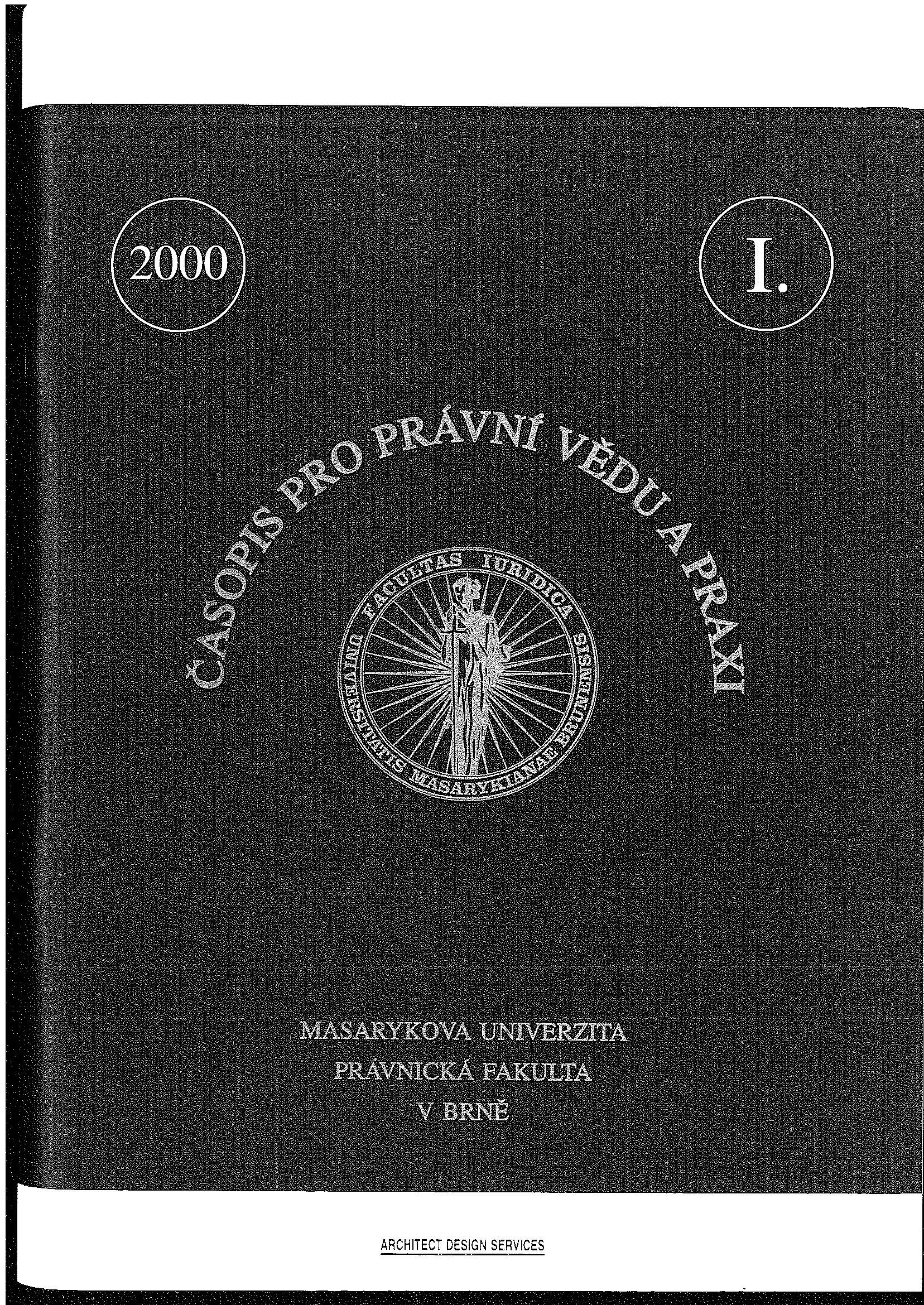
Obecný tvar právní normy zní: jestliže (hypotéza), pak (dispozice). Ponechávám stranou otázku, zda eventuelní třetí člen, totiž sankce, je součástí téže normy nebo zda tvoří dispozici normy komplementární. Zkoumejme pouze logickou strukturu výše uvedené normy dvoučlenné, konkrétně důsledky její inverze.
More...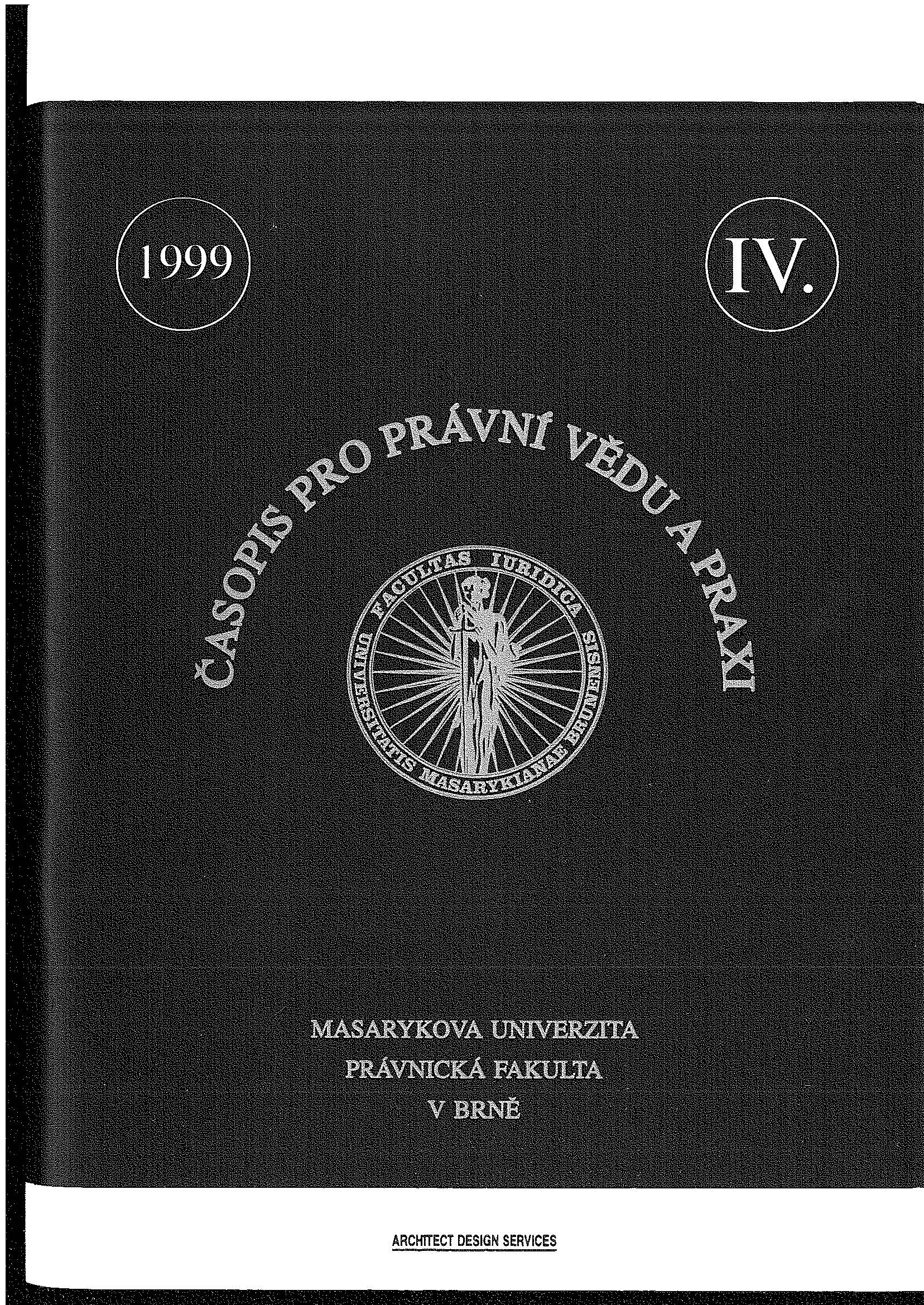
Tvrdím - a chci toto tvrzení podrobně zdůvodnit -, že mé učení nazvané "normativní institucionalismus" nebo krátce "neo-institucionalismus" je výplodem Brněnské školy ryzí nauky právní, kritickou reakcí na filozofii Františka Weyra a na teleolgii Karla Engliše a Jana Loevensteina. Není, jak by označení neo-insitucionalismus mohlo vsugerovat, inspirováno klasickým institucionalismem Maurice Haurioua (ani Carlem Schmittem). Pokusím se doložit filiaci neo-institucionaismu s Brněnskou školou ve dvou perspektivách: 1. vylíčením etap mého kritického postoje k ryzí nauce právní a 2. kritickým rozborem základních tezí ryzího normativismu s príslušnými odpovědmi neo-institucionalistické teorie.
More...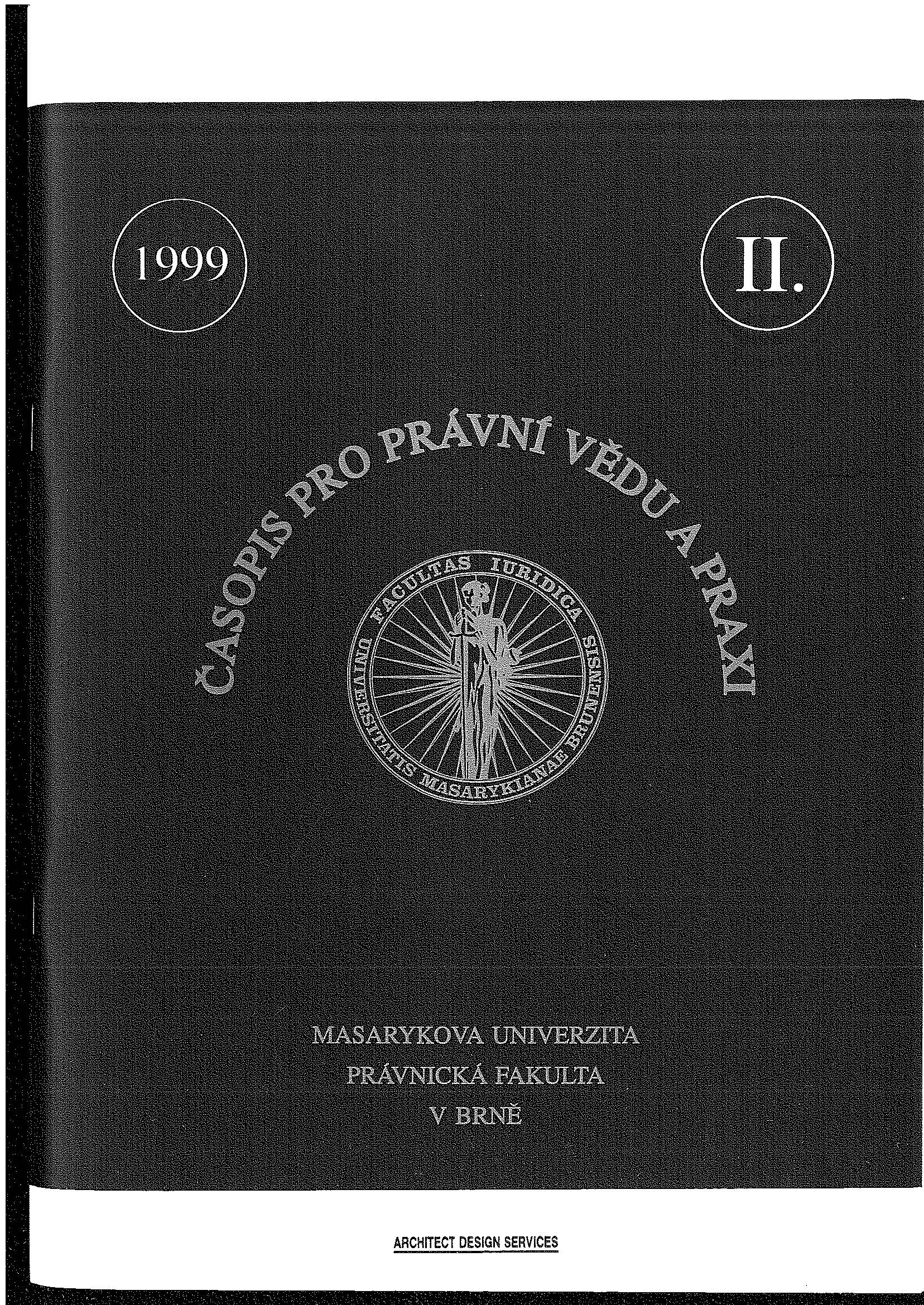
Při příležitosti významného osmdesátiletého jubilea narození významného českého právního teoretika, filozofa a logika, působícího od roku 1968 v Rakousku, prof. Dr. Dr. Oty Weinbergera, uspořádalo České sdružení pro právní a sociální filozofii společně s Katedrou práva a právních učení Právnické fakulty Univerzity Karlovy dne 9. dubna 1999 v budově právnické fakulty slavnostní shromáždění.
More...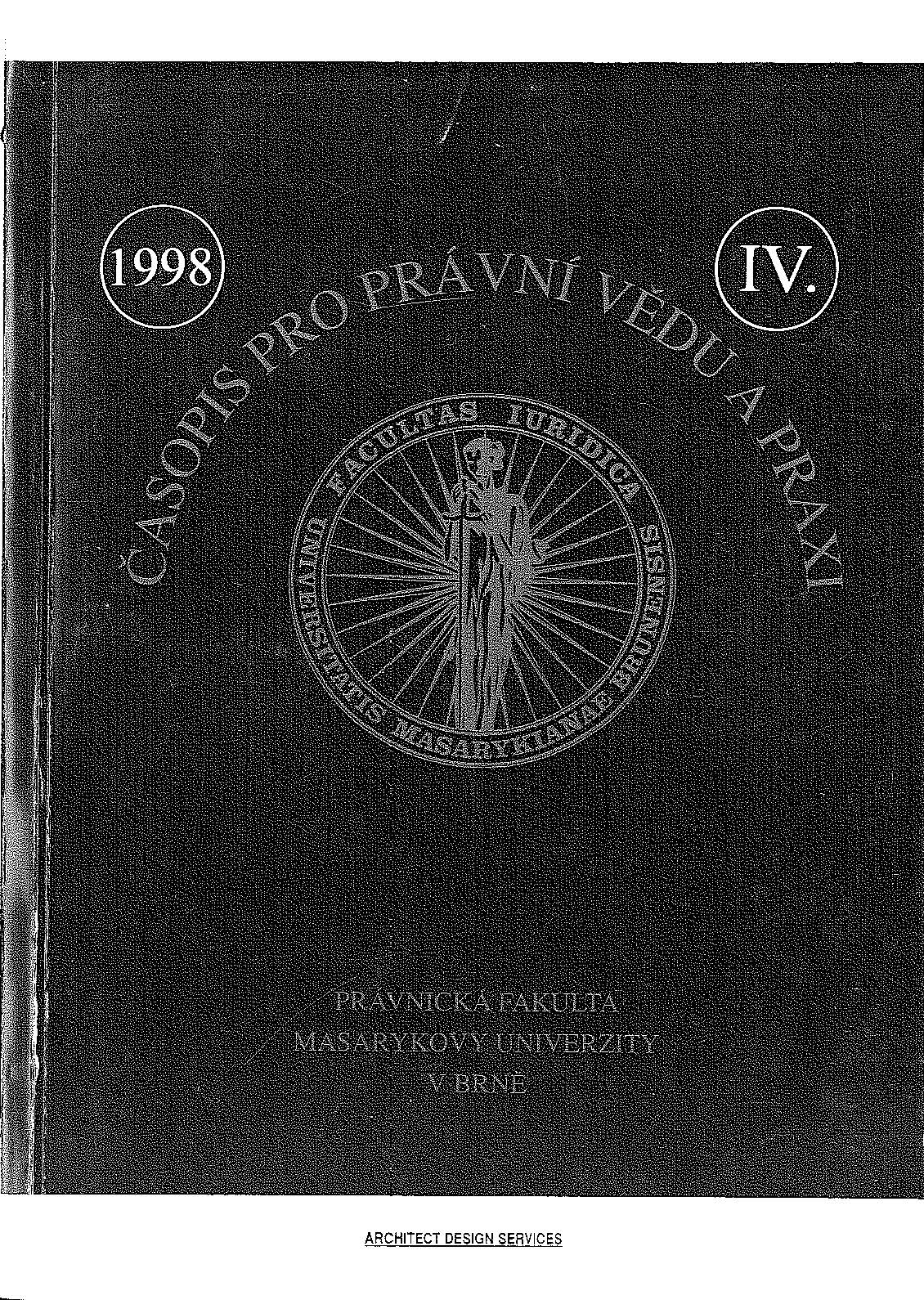
The author of this article deals with the position of philosophy of law within the system of legal sciences. She defines the philosophy of law as the condition of identification of co temporary legal theory. She analyses the philosophy of law on the basic of a brief historic excursion. In the excursion she attempts to show the roles philosophy of law played in the history of legal thinking. The function of contemporary philosophy of law is defined as concern for people, or putting it more accurately, concern for justice.
More...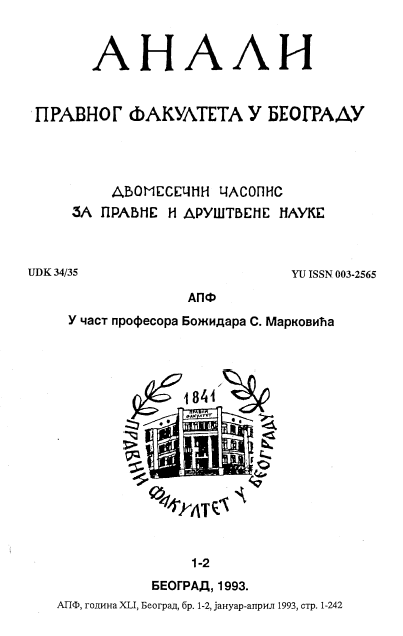
Not only because of the fact of more than six decades of activity, but primarily because of remaining, in spite of everything, consistent and harmonious - the undertaking of professor Božidar S. Marković remains unique in our legal philosophy, indeed. He has remained faithful to the foundations fixed in his Paris doctoral dissertation all the way. That consistence relates to the conception of duality of the legal phenomenon, to the viewpoint that above and outside the positive law there exists a just law, as well as to the necessity of their permanent coordination. The center of Marković’s legal philosophy is taken by justice and equity, which he has considered with decisive anti-metaphysical orientation and by rejecting every kind of essentialism, but with accepting human finalism. The continuity and consistency of such philosophy are based on the continuity and consistency in the universal , methodical, vitalistically painted and thoroughly verified research of justice and equity in their practical-concrete dimension. Its originality-should be traced in Marković’s accentuation of democratic political regime as a necessary prerequisite of a just law. The integrity of legal philosophy of professor B. Marković, in fact, has its final and most powerful foundation in the integrity of his personality.
More...
The relations between the positive and just law are a basic question of the philosophy and theory of law and a central theme of research of Božidar Marković. Positive law has to be just, although this is not always the case. The causes of such disharmony should be found in the dual character of the positive law, in the changing criterion of substantive justice and the static nature of the positive-law rule as contrasted to the dynamic nature of substantive justice. In order to overcome, or at least attenuate, the disharmony between the positive and just law, namely between the state and society, it is necessary, on the one hand, to have démocratisation of state - which is the task of the politics, while, on the other, the elimination of the antinomy between the static nature of positive order and the social evolution - which is the task of the theory of law. The theory, namely, has to suggest an adequate method for feeding the positive law with social conception of justice.
More...
After introductory remarks on the significance of the problem of justice, the author treats typical views on this category and grounds for its absoluteness, first of all as pure ideas and ideals of the kind. Due to that even the greatest thinkers contribute to the creation of illusions of justice, while the remaining mass, due to the effect of objective factors and subjective elements, is inclined to cherish various illusions concerning justice. Most typical aspect of such illusory quality are: philosophical idealism, which treats justice as an abstract value; theological idealism treating justice in a dual way, while distinguishing God’s and man’s justice; humanistic idealism, which connects justice with so-called social contract and human rights; socio-political idealism, including particularly marxism, attempts to represent justice as Utopian and eschatological. All these aspects of illusory quality are, in fact, ideological, and more particularly the mandst one, which had disastrous consequences. In addition, while articulating his own conception of justice, the author emphasizes the significance of the problems of justice in relation to an integrally conceived and developed theory' of the state and legal order.
More...
Controversial issue of B. Marković being influenced by French philosopher Bergson is treated in the article. Although not knowing Bergson at the time of writing his doctoral thesis, Marković came to the same conclusions in the matter treated in it. After reading Bergson’s work "Two sources of morals and religion" and taken by it, Marković wrote the article "Crisis of social sciences and misticism in France" where he stated Bergson’s conceptions using his words. For the collection of works "Sociological Review", published in 1938, Marković wrote a critical review of mentioned book challenging Bergson’s excessive misticism and anti-intellectualism. In his obituary notice on Bergson Marković wrote (in the review "Arhiv za pravne i društvene nauke") about the significance of Bergson for social, moral and legal philosophies. According to Marković, Bergson’s social and moral philosophy should be conceived more as a synthesis of a school of thoughts in French philosophy of new era in the sphere of social sciences, but also as an incentive for opening new perspectives. Bergson’s school of thoughts has contributed in Marković’s developing and finalizing his (Marković’s) conceptions on the philosophy of law and sociology.
More...
The state of law as a legal thinking and legal experience - due to theoretical objections and pragmatic challenges is, at the same time, a "non-law state". Therefore this notion should be conceived as an attempt to provide necessary lawful form to theoretical and practical conflicts. Since such goal is impossible to reach in an adequate way, the reason is found for the evolution of "state" with laws" up to the state of law", as well as for devolution of the state of law down to the state with laws. This, however, does not mean that the idea of state of law should be rejected, since it was instrumental in establishing collective awareness and values which were close to the idea of justice with the man in its center. This in fact is the present-day goal of the state of law. The state of law (or the one of the rule of law) as a legal thinking and as legal experience has never been realized in the way it has been conceived originally. This, however, does not diminish the need for striving toward an ever better, and best, state of law. Such an effort is the only firm proof that principal civilisational achievements have not yet been abandoned, namely the ones which have been in the very' foundations of the original idea of the state of law.
More...
Special position is taken in the history of Serbian legal-philosophical thinking by Jovan Filipović (1819-1876). An impartial judge, the minister of justice and education, man of letters and a translator, Filipović has published his work in the sphere of philosophy of law which was first systematic treatment of the matter (first published in 1839, second edition in 1863). Filipovié was a follower of the natural (prudent) law. In his philosophy of law he connects natural law with morals, while challenging the ideas of Tomasius and Kant.
More...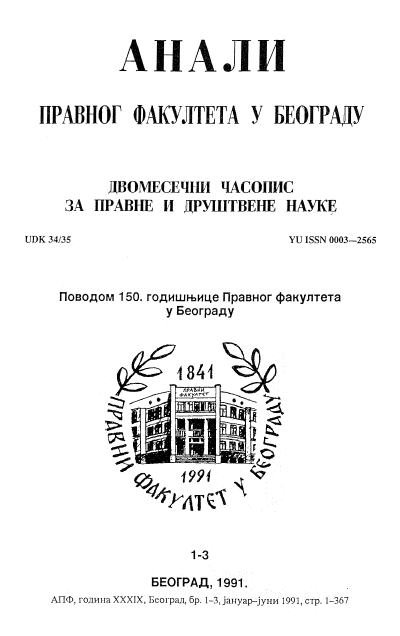
The subject-matter discussed are the great problems of the philosophy of law and state. Emhasizing that the state and the law are closely connected into a whole (state-legal order), the author considers that historicity is not only the past of that creation, but also a specific expression of two of its dimensions - that of time and that of space. This is why it is possible to discern in the historicity various influences of social factors in the given time and space. Such conception is rather significant in terms of methodology, because it is confronted to abstract schemes, but also in proclaiming apecific institutions as universal ones. After pointing at the contribution of Hegel, the historical-legal school of thinking, and historical materialism in studying the historicity of state and law, the author treats also some essential moments and circumstances of expressing the historicity. These are: class struggle, political constitution of society and more particularly the civilisational- cultural formations. Every state-legal order expresses its identity and confirms it in its own historicity, including that of the entire society. Accordingly, it is significant to find out the position of that creation in the development of the civilisational-cultural formations and more particularly of the spirit of times and of the habitus of the space where the specific state-legal order does exist. In accordance with that it is also necessary to adapt the view of the nature of tilings as a category which relates to the entire creation mentioned above, and also to coordinate the conceptions of positive law and of the natural law. In such a way it is possible to understand also the general historical meaning of the state and the law.
More...
Normative nature of law should be identified with the normativism in the sphere of law. The normative character of law is a basic characteristic of law which emanates out of its very essence as thinking, out of the collection of notions of compulsory behviour of people. The law, namely the legal norm, is a spiritual, ideal phenomenon which expresses something which does exist as something which should be existing. The norm does not exist only because it is valid, but it does so as an expression af that which is necesary. Along these lines, legal norm is an ideal phenomenon off the limits of time and space, and the one which exists in the real world in the spirit (mind) of people or in the linguistic symbols. It means that the normative nature of law originates out of the reality, and first of all out of the social facts, which cannot replace the norm as a spiritual phenomenon. To a certain sense the normative character of law may be considered as a form of law, as distinguished from its contents (the substance of legal institutes) as the matter, because die legal norm is distinguished from other types of norms by its formal character and dependence on state compulsion, which is expressed in the form of sanction against its being not implemented. The formal character itself, on the other hand, means tliat the law determines in an exact way how do legal norms originate, as well as when they cease to exist as such. The normative nature, in other words, does exist even if one and only one norm is applied to one and only case - if such norm really exists.
More...
Every law has first of all to be just, but in reality this basic principle is not always applied. The author inquires into the causes of that phenomenon, into relationships between the positive and just laws and into the issue of the possibility to eliminate or attenuate this discort between the two. In order to answer the above questions one should know first of all what is justice. Justice appears in two aspects, as a formal justice ans as substantive justice. The formal one menas the principle of equal treatment of equal matters, namely dissimilar treatment of dissimilar matters, but in proportion to their dissimilarity. Substantive justice contains, on the other hand, a human criterion of the value of matters, namely a judgment on equal matters and on the degree of dissimilarity. This criterion is, however, very changeable since human spirit is not able tzo know the absolute truth and thus the absolute justice. Because of that, human justice is not only changeable bu also, in terms of value, it is a relative category. The other significant factor influencing the relationship between the positive and just laws is the duality of the legal phenomenon. The law is, namely, created, by the society and by the state and these two sources of law are rather frequently controversial. The third reason for the discord between these two kinds of law is found in the static element of the positive formula which is opposed to the dynamics of the substasntive law. Positive rule cuts off by its formulation the course of evolution, while the social contents of the formula is constantly changing. All these inevitable conglicts should be attentuated ba a legal method - a combination of logical reasoning according to legal texts and sociological observation of social facts in full is the existence in the state of complete freedom of establishing and expressing of opinions concerning the substance of the relative and changeable substantive justice. Because of that, the differences between the positive and just laws in a democratic state are the smallest. Expressed conceptions are thus an expression of rational scepticism which originates out of limited possibilities of human perception and knowledge, but also out of the nature od the very legal phenomenon and the relevant techique.
More...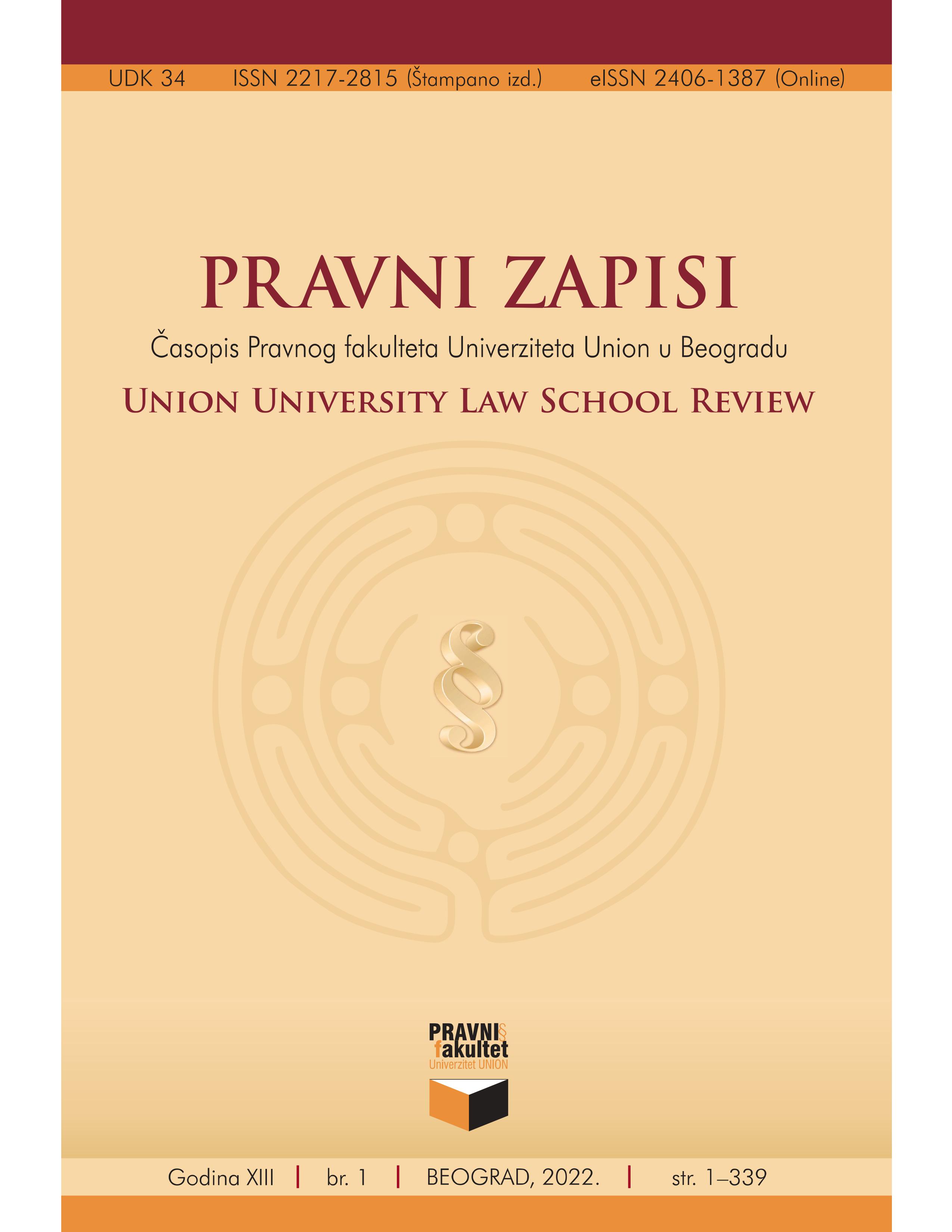
In the present paper, the author provides a critical appraisal of Marko Božić’s understanding of the principle of state secularity, defended in the previous issues of this journal. Firstly, the author critically examines the non-contestability thesis that is arguably held by Božić and argues that it raises the objection of conceptual imperialism. In the following sections, the author turns to Božić’s extralegal theory (and concept) of secularity based upon the notion of “equality in freedoms”. In particular, the author argues: (a) that the concept of secularity that Božić develops is inherently flawed in several important ways; (b) that an extralegal theory of secularity – that of Božić or anyone else – should not be considered a starting point when interpreting a constitutional principle of secularity; (c) that the concept of secularity that Božić develops is by no means a useful interpretative tool in virtue of the fact that it significantly departs from positive law.
More...